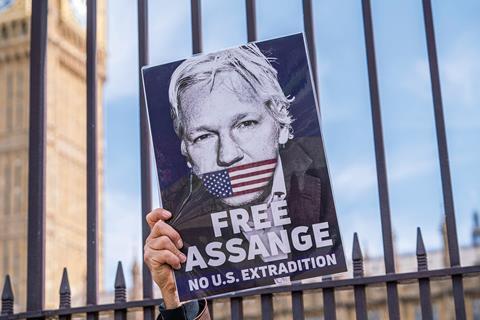In 2011, a senior district judge ordered the extradition of Julian Assange. Long before live-tweeting from court was regulated, the hearing was the first to be covered in this way by one of the television news channels. More than 13 years on, the Wikileaks founder is still in London. Today, he may hear whether his extradition is finally going ahead.

The district judge’s decision – upheld by the Supreme Court in 2012 – was to extradite Assange to Sweden, where he faced allegations of sexual molestation and rape. But Assange always believed he was at risk of being sent to the United States. That is why he jumped bail and spent nearly seven years of self-imposed exile at the Ecuadorian embassy in London.
The US now wants to try him on charges of conspiracy to obtain and disclose national defence information. In June 2022, Priti Patel ordered his extradition to the US. Last June, a High Court judge turned down his written application for permission to appeal against the home secretary’s decision. Assange renewed his application at an oral hearing this February.
Giving judgment in March, Dame Victoria Sharp and Mr Justice Johnson held that only three grounds of his application were arguable. First, Assange might be prejudiced because of his nationality. Second, this prejudice would be incompatible with his right to freedom of expression. And, third, there was inadequate protection against the risk that he might face other charges or that he might be sentenced to death.

However, said the court, those concerns could be addressed by suitable assurances from the US authorities. We know that the US has provided assurances but we do not know what they say. Today, Assange’s lawyers can be expected to argue that they do not meet the court’s concerns. The judges are allowing two hours for the hearing and Assange’s supporters are expecting a ruling on the day.
Let us look at the grounds that remain in play. Section 81 of the Extradition Act 2003 bars extradition of a person who might be prejudiced at trial on grounds of nationality. The court found this arguable.
If he is tried in the US, Assange will rely on the First Amendment to the US constitution, which protects freedom of speech. In April 2017 Mike Pompeo, who was then director of the CIA, asserted that Assange ‘has no First Amendment freedoms’ because ‘he is not a US citizen’.
Pompeo was US secretary of state when Assange’s extradition was requested. But Dame Victoria Sharp and Mr Justice Johnson said his assertion had been rightly regarded by the district judge as immaterial. It was not ‘expert evidence on a question of foreign law’.
However, the courts had also received five sworn statements from Gordon Kromberg, a federal prosecutor. ‘Concerning any First Amendment challenge,’ Kromberg had written, ‘the United States could argue that foreign nationals are not entitled to protections under the First Amendment, at least as it concerns national defence information and, even were they so entitled, that Assange’s conduct is unprotected because of his complicity in illegal acts and in publishing the names of innocent sources to their grave and imminent risk of harm.’
If Assange is not protected by the First Amendment, there would arguably be a breach of his right to freedom of expression under article 10 of the human rights convention. Incompatibility with human rights is a statutory bar to extradition.
The final ground of appeal that the judges regarded as arguable relies on section 93 of the Extradition Act. This bars extradition if the suspect could be sentenced to death or if there are no ‘specialty’ arrangements (referred to in the statute as ‘speciality’). Broadly speaking, these prevent a person being extradited on one charge and then tried on another.
Assange accepts that none of the offences for which extradition is sought carries the death penalty. But, based on comments by Donald Trump and others, he believes he could be charged with aiding and abetting treason or espionage, both of which are capital offences in the US.
Assange has the right to attend the hearing today, either in person or remotely. In February, he had a persistent cough which his lawyers said would have made his attendance difficult.
He was recently visited in prison by the Icelandic politician Sunna Ævarsdóttir, representing the Parliamentary Assembly of the Council of Europe. This week, she expressed her ‘deep concern’ for Assange’s wellbeing.
If the court is satisfied with the US assurances, Assange will have no grounds of appeal left. But he would not be the first to argue that his extradition should be barred on grounds of ill-health. The one thing I have learned from covering the twists and turns of Assange’s story over the past 13 years is that nobody has any idea what will happen next.
joshua@rozenberg.net































No comments yet